Coconut charcoal is smokeless, odorless, and produces high heat for BBQ grilling. Made from 100% coconut shells. Exporting to Saudi Arabia and Dubai.
Coconut charcoal stands out as a sustainable and healthy product, naturally produced from premium coconut shells. Besides, with high carbon content, low ash content, and no smoke, Coconut charcoal will boost the taste of foods at grilling parties.
Discover how eco-friendly coconut charcoal can meet your heating or grilling needs in this article. Made from pure coconut shells, coconut charcoal offers clean-burning, sustainable fuel that minimizes negative environmental impact. Learn more about PNP Charcoal’s commitment to quality, delivering outstanding green products suitable for home or business use.
Coconut charcoal is derived from coconut shells, the hard white part inside the coconut. The production process involves collecting coconut shells, cleaning them, and subjecting them to high-temperature pyrolysis in an oxygen-deprived environment to create charcoal. This method efficiently utilizes a renewable resource, resulting in a high-quality product known for its compact form and low ash content. Coconut charcoal burns hotter, longer, and produces less smoke compared to wood charcoal, making it ideal for grilling and other cooking purposes.
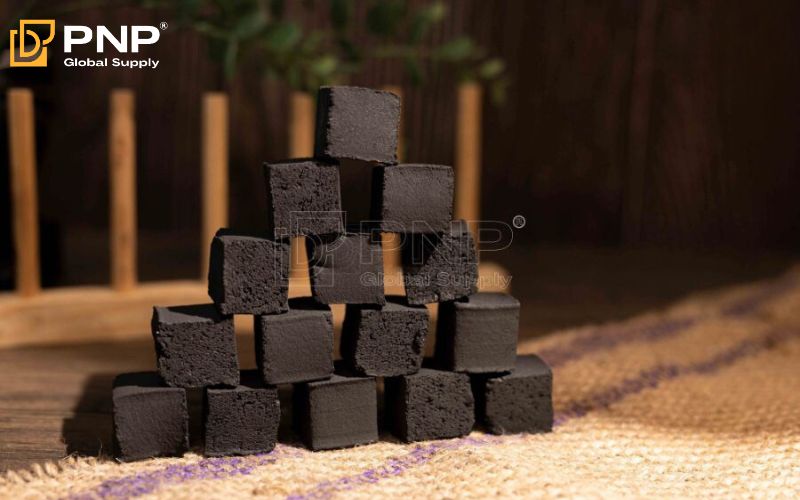
The production of coconut charcoal involves several steps to transform coconut shells into activated carbon:
Raw coconut shells are sourced directly from coconut processing facilities. These shells are carefully selected, ensuring they’re free from impurities, and dried to reduce moisture content for optimal combustion quality.
The prepared coconut shells are carbonized in specialized kilns under controlled conditions, typically at temperatures ranging between 400°C and 600°C. This process converts shells into high-quality charcoal, ensuring a consistent carbon content and superior calorific value.
After carbonization, coconut charcoal is ground into fine powder and sieved to achieve uniform granularity. The charcoal powder is then thoroughly mixed with natural binders, typically tapioca starch, to enhance cohesiveness and maintain eco-friendly properties.
The charcoal and binder mixture is processed through a briquette press machine, forming uniform briquettes. Pressure and temperature settings are carefully regulated to ensure briquettes achieve high density, durability, and consistent shape.
Freshly pressed coconut charcoal briquettes are dried in specialized drying rooms or ovens at controlled temperatures. This process reduces moisture content significantly, ensuring excellent burning performance, reduced smoke, and minimized ash content.
Finished coconut charcoal briquettes undergo rigorous quality inspections, including tests for moisture, density, ash content, calorific value, and combustion performance. Qualified products are then packed securely, labeled clearly, and prepared for export or distribution, ensuring optimal customer satisfaction and compliance with international standards.
This process enhances the surface area of the charcoal, making it highly effective for applications like filtration and adsorption.
=> Discover the outstanding advantages of eucalyptus now! If you are looking for unique natural products, visit the following pages Own Sawdust Charcoal Briquettes at Low Cost
Coconut charcoal is an environmentally responsible alternative to traditional wood charcoal. It is made from recycled coconut shells, a natural byproduct of the coconut industry, reducing deforestation and minimizing waste. Unlike hardwood charcoal, which contributes to deforestation, coconut charcoal production is a sustainable and renewable process. Additionally, it is biodegradable and carbon-neutral, making it a top choice for eco-conscious consumers.
One of the standout features of coconut charcoal is its extended burn time. Compared to regular wood charcoal, coconut charcoal burns significantly longer and more consistently, making it ideal for BBQ, grilling, and shisha. With a high fixed carbon content, it generates a steady and intense heat while consuming less fuel, making it a cost-effective option for both home users and commercial applications.
Coconut charcoal is known for its low ash residue, typically producing less than 3% ash, compared to wood charcoal, which often leaves behind a higher volume of waste. This ensures a cleaner cooking experience with minimal cleanup required. Moreover, its high calorific value allows it to reach higher temperatures and maintain consistent heat output, making it a preferred choice for chefs, pitmasters, and hookah enthusiasts.
Unlike some conventional charcoal that contains synthetic binders and chemical additives, PNP Charcoal’s coconut charcoal is 100% natural and free from toxic chemicals or accelerants. This ensures a pure, odorless, and tasteless burn, making it perfect for barbecue grilling, shisha, and indoor cooking. It does not produce excessive smoke or unpleasant fumes, providing a safer and healthier experience for users.
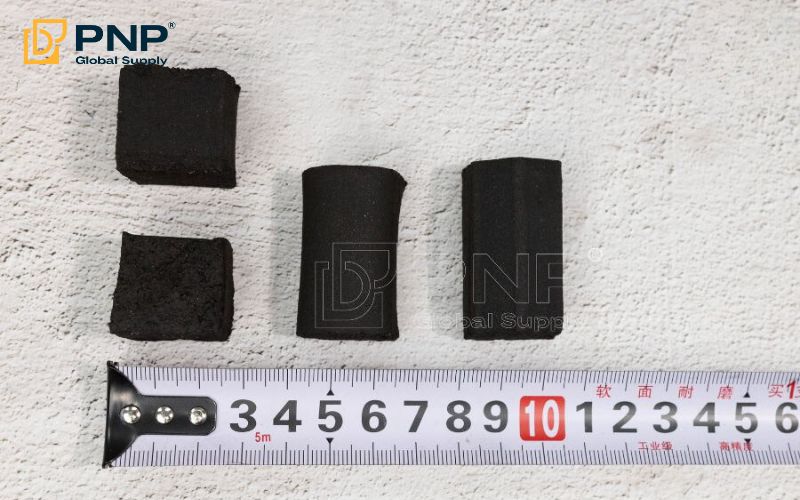
Coconut charcoal is widely used in barbecue and grilling due to its high heat retention and low smoke emission. Unlike traditional wood charcoal, coconut charcoal briquettes produce a consistent, long-lasting heat without releasing excessive smoke or unpleasant odors. This makes it ideal for grilling meats, seafood, and vegetables, ensuring a clean and even cook. Additionally, its low ash content means less mess and easier cleanup after your barbecue session.
Coconut charcoal is the preferred choice for hookah and shisha enthusiasts due to its pure and chemical-free composition. Unlike quick-light charcoal, which contains chemical accelerants, coconut charcoal burns slowly and evenly, providing a smooth, odorless, and flavorful smoking experience. The high carbon content ensures a longer burn time, meaning fewer charcoal replacements and a more enjoyable session.
Activated coconut charcoal is a powerful natural filter used in water purification, air filtration, and toxin absorption. Thanks to its high porosity and absorption capacity, it effectively removes impurities, heavy metals, and harmful chemicals from water and air. Many commercial air purifiers and water filters use activated coconut carbon to provide cleaner, safer environments for homes and businesses.
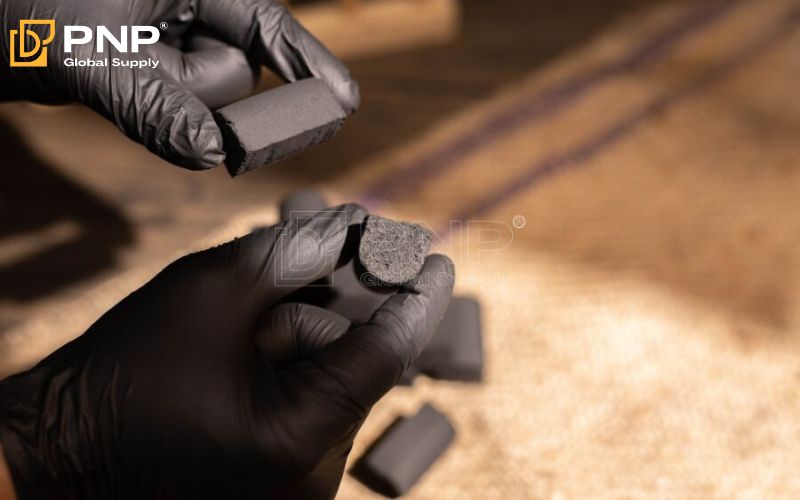
When choosing the right type of charcoal, it’s essential to consider sustainability, burning efficiency, smoke emission, and safety. Below is a detailed comparison between coconut charcoal, wood charcoal, and bamboo charcoal, highlighting their key differences.
| Feature | Coconut Charcoal | Wood Charcoal |
| Sustainability | Yes (Made from recycled coconut shells, eco-friendly) | Less |
| Burning Time | Long (High carbon content ensures extended burn) | Long (Similar to coconut charcoal, but slightly less efficient) |
| Smoke Emission | Minimal (Clean-burning, low smoke) | Minimal (Low smoke but may have a slight natural odor) |
| Chemical-Free | Yes (100% natural, free from additives) | Yes (Usually chemical-free, but quality varies) |
| Heat Output | High (Consistent and intense heat) | High (Comparable to coconut charcoal) |
| Ash Content | Low (<3%, minimal residue) | Low (Less ash, but higher than coconut charcoal) |
| Odor & Taste | Odorless (No unpleasant taste or smell) | Odorless (Mild natural scent, but generally neutral) |
| Best Uses | BBQ, Shisha, Cooking, Filtration | Air & Water Purification, Cooking, Skincare |
Selecting high-quality coconut charcoal is crucial for achieving optimal performance, efficiency, and safety in BBQ, shisha, and filtration applications. Here are the key factors to consider:
The carbon content of coconut charcoal directly impacts its burning efficiency, heat output, and longevity. Look for charcoal with at least 80% fixed carbon content, as it ensures:
A high-quality coconut charcoal should have less than 5% ash residue after burning. Lower ash content ensures:
The shape of coconut charcoal affects burning efficiency and application suitability:
When buying coconut charcoal, always check for quality and safety certifications such as:
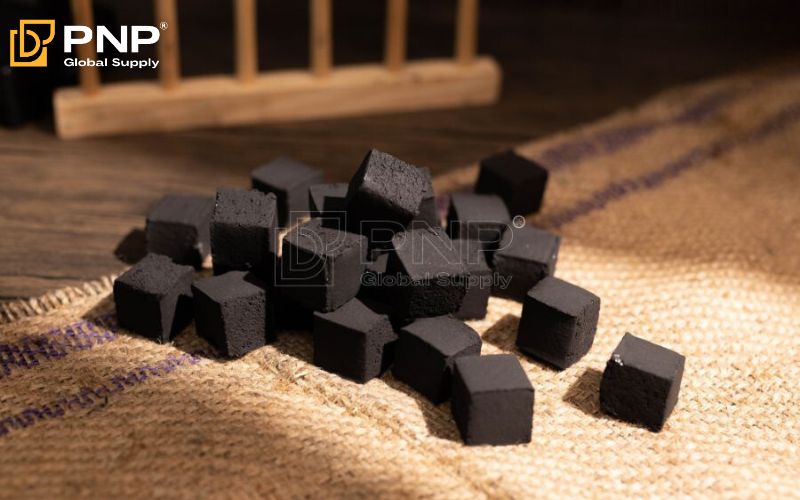
PNP Charcoal, established in 2015, specializes in the import and export of high-quality coconut charcoal products. With over 10 years of experience, the company has become a trusted name in the Vietnamese and international charcoal industry. PNP Charcoal provides comprehensive logistics services, including customs clearance, international transportation, and global charcoal supply.
With a production capacity of up to 600 tons per month, PNP Charcoal meets the demands of customers worldwide, particularly in Saudi Arabia and Dubai. The highly skilled team is committed to delivering products with exceptional purity and performance. PNP Charcoal is a premium brand, renowned for the superior quality of its coconut-based charcoal products.
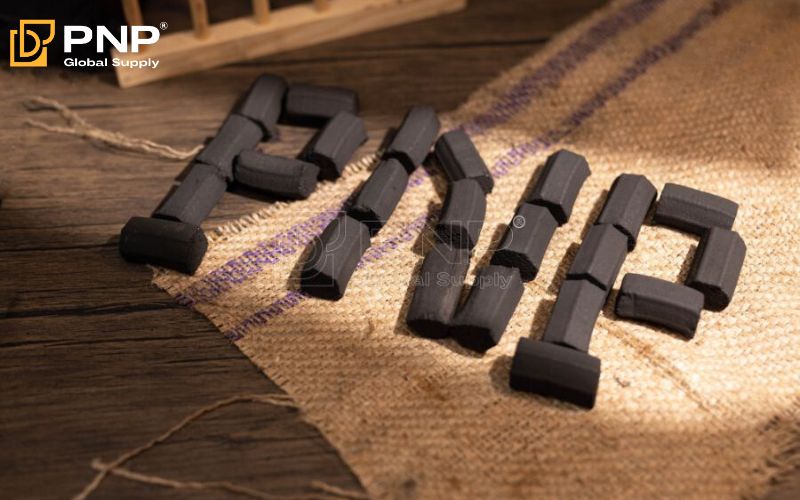
In summary, eco-friendly coconut charcoal is an energy-efficient choice for grilling and heating needs, meeting both environmental and functional requirements. If you are seeking high-quality and reliable charcoal, contact PNP Charcoal, the best choice. The company is committed to providing top-quality, environmentally friendly briquettes that adhere to strict regulations, helping you live in a cleaner world.
Answer: Yes, coconut charcoal is made from renewable coconut shells, a byproduct of the agriculture industry. It reduces waste and deforestation compared to traditional wood charcoal. Its production emits fewer greenhouse gases, making it a sustainable choice for environmentally conscious consumers.
Answer: Coconut charcoal burns for 3 – 3.5 hours at a consistent high heat (6892 kcal/kg). Its dense structure and low moisture content make it ideal for slow-cooking, smoking, or prolonged grilling sessions, such as BBQ catering or rotisserie cooking.
Answer: Coconut charcoal produces a mild, sweet smokiness without overpowering the natural flavors of food. Unlike traditional charcoal, it lacks chemical additives, ensuring a cleaner taste-perfect for seafood, poultry, and delicate dishes.
Answer: Restaurants favor coconut charcoal for its high heat retention, minimal ash production (1-3%), and cost-efficiency. It reduces relighting time and cleanup, streamlining operations for high-volume kitchens and commercial BBQ setups.
Answer: Premium coconut charcoal has:
Minimal ash residue (under 5%). Avoid products with visible sand, dust, or uneven cracks.
To sum up, eco-friendly coconut charcoal briquettes are an energy-saving choice for grilling and heating, meeting both environmental and functional demands. In case you`re looking for good quality and reliable charcoal; please contact PNP Charcoal which is your best avenue. The company guarantees that its customers will always have high quality, environmentally friendly briquettes that adhere to strict regulations enabling one to live in a cleaner world.
After receiving the full payment, PNP will do the Telex release immediately.
1. Do you provide a sample for this product?
Of course! All you need to do is send us your contact details and the type of charcoal that you want to receive samples!
2. How many countries have you exported this product to?
We mainly export coconut charcoal to the Middle Eastern market. Plus, our charcoal products have been shipped to Korea, Japan, Taiwan, Singapore,…
3. How can I order this product?
Thanks for your interest in our products. To order, you can contact us via WhatsApp or Email. Just hit the buttons on the right of your screen!
